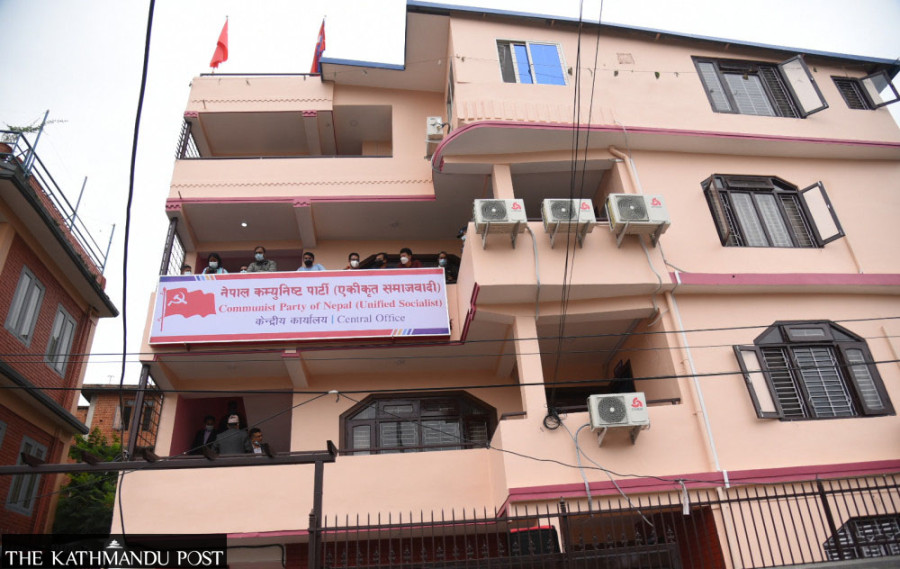Politics
After losing national party status, Unified Socialist bats for unity among country’s leftist forces
The party, led by Madhav Kumar Nepal, is in talks with JSP and leaders who had either quit or were expelled by CPN-UML.
Purushottam Poudel
The CPN (Unified Socialist), which was formed in 2021 by a dissident faction of the CPN-UML, failed to cross the three percent vote threshold under the proportional representation system in the November 20 elections. As a result, it lost the national party status. And now 16 months after splitting from the UML, the Unified Socialist is talking about unifying Nepal’s left parties.
The party's politburo meeting, which ended on Tuesday, has decided to take an initiative for unifying all leftist parties of the country. Party officials said they are currently considering a merger with the Janata Samajbadi Party (JSP), a national party with 12 members in the federal parliament.
“Yes, we are in discussion with the JSP for party unity,” Jagannath Khatiwada, the spokesperson for the Unified Socialist, told the Post. “The politburo meeting has decided to work for left parties’ unity, and since the JSP is also a leftist party, we are considering a merger.”
But Ashesh Ghimire, another leader of the Unified Socialist, said the two parties could either merge or simply collaborate.
A JSP leader confirmed to the Post that talks for a possible unification have been ongoing, but added that the discussions have not been serious.
“We have not held serious discussions for unification, and collaboration is always possible,” Manish Kumar Suman, the party spokesperson, told the Post.
On August 22 last year, Maoist Centre chair Dahal and Unified Socialist chief Nepal had decided that their parties would contest the November 20 election with a common manifesto. But the decision proved to be rash as other leaders of Nepal’s party quickly warned him against any such move.
The two parties had decided to unify after the elections and had even formed a joint task force for the purpose. While the progress on that front remains unknown, the party is mulling over unifying all left forces.
If the Unified Socialist and the JSP merged, the new party would have 22 legislators in Parliament—JSP has 12 and the Unified Socialist 10.
Unified Socialist insiders also claim that they are working to bring UML dissidents and others expelled by the party including Ghanashyam Bhusal, Bhim Rawal and Bamdev Gautam into the party.
Rawal, a UML dissident who was denied election ticket in November, however, denied having any intention to join the Unified Socialist.
“I still belong to the UML and have no plan to quit the party anytime soon,” Rawal told the Post.
Gautam on December 27 called on Madhav Kumar Nepal, the Unified Socialist chairman, at the latter’s party office. Although some people speculated that the meeting was part of Gautam’s preparations to join the Unified Socialist, his personal secretary Dipak Tamata said there are no such plans.
“It is true that Gautam had visited the party office of Unified Socialist but that does not mean he is planning to join the party,” Tamata told the Post. “Gautam had met Nepal to suggest that he should support the Dahal-led government.”
However, a Unified Socialist leader who claims he is working to bring leaders like Gautam, Rawal and Bhusal into the party, said negotiations are in the final stages. “We cannot disclose all the details, but the three leaders will soon join our party,” he claimed, requesting anonymity.
While Rawal rejected the claim, a source close to Bhusal said several leaders including Bhusal who have quit either the UML or the Maoist Centre will soon join the Unified Socialist.
The Unified Socialist has yet to decide whether to join the Dahal-led ruling coalition although Dahal has been insisting that the party come on board.
“A soon-to-be-held meeting of our party secretariat will decide whether to support the government or not,” said Khatiwada.
Dahal, who became prime minister on December 25 with the backing of the UML, the Rastriya Swatantra Party, the Rastriya Prajantra Party, the Janata Samajabadi Party, the Janamat Party, the Nagarik Unmukti Party and a few independent lawmakers, has the backing of 169 lawmakers—31 more than required to form government.
The new parliament is set to convene its first meeting on January 9 and Prime Minister Dahal will go for a floor test on January 10.




 14.12°C Kathmandu
14.12°C Kathmandu














